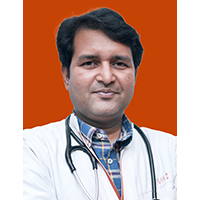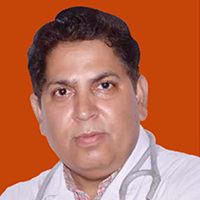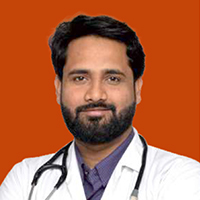

Successful Treatments
Clinics
Doctors
What is Heat Stroke?
A heat stroke, also known as sun stroke, is a condition that is caused by body overheating, which happens due to exposure to high temperatures or physical activity in high temperatures for too long. There are a few stages of heat related conditions, of which heat stroke is the most serious and can happen if body temperature rises to 104 degrees Fahrenheit or higher, and is most common during the summer season.
This condition, if not treated, can quickly damage the brain, heart, kidneys and muscles. The damage gets worse the longer treatment is delayed, which increases risk of serious complications of death.
There are two types of heat stroke – non-exertional heat stroke and exertional heat stroke.
When a heat stroke happens due to being in a hot environment, it is known as non-exertional/classic heat stroke, and it causes a rise in core body temperature. It happens after exposure to hot, humid weather for a long period of time and happens most often in older adults and people with ongoing health conditions.
Exertional heat stroke is caused by an increase in core body temperature, which is brought on by intense physical activity in hot weather conditions. Anyone exercising or working in hot weather can get this condition, but it is most likely to occur if you are not used to high temperatures.
Heat Stroke Causes
Wearing heavy and/or synthetic clothing can prevent sweat from evaporating and cooling the body, which can cause core body temperature to rise
Consumption of alcohol, which can affect the body’s ability to regulate temperature
Dehydration brought on by not drinking enough water, leading to loss of fluids through sweating
Heat Stroke First Aid
If someone gets heat stroke, immediate action is required to help cool that person down.
Shift the person into a shaded area or take them indoors
Excess clothing should be removed to help in evaporation of sweat
The person should be placed in a cool tub of water or cool shower, sprayed with garden hose, sponge with cool water, fan while misting with cool water or place ice packs or cold, wet towels on person’s head, neck, armpits and groin
Ice should not be used to older patients, young children, patients with chronic illness, or anyone whose heat stroke is non-exertional
How To Prevent Heat Stroke
To avoid heat stroke, the following precautions can be taken during hot weather conditions:
Wear loose-fitting and light weight clothes
Use sunscreen to protect yourself against sunburn
Consume plenty of fluids to keep yourself hydrated
Take extra precautions with certain medications that can hamper your body’s ability to stay hydrated and cool down
Avoid beverages containing caffeine or alcohol, as both of these work as diuretics and lead to more loss of fluids
Heat Stroke Treatment in Ayurveda
Ayurvedic treatment of heat stroke is not limited to alleviating the symptoms but is focused on thorough treatment of the disease.
Herbal Remedies
Ayurvedic herbs like Amla, Guduchi and Shatavari are known for their cooling properties and can help in both preventing and managing heat stroke.
Dietary Adjustments
Following a Pitta-pacifying diet that includes cooling foods such as cucumbers, melons and leafy greens can help to regulate body temperature and prevent heat stroke.
Panchakarma Therapies
Takradhara (continuous pouring of medicated buttermilk on forehead) and Chandanadi Abhyang (full-body massage with sandalwood oil) helps to cool the body, calm the mind and balance Pitta dosha, which is vitiated during heat stroke.
Meditation & Yoga
Asanas and Pranayama that can balance Pitta dosha as well as relax and cool down the body are great for managing heat stroke, and can also prevent it.
Jiva’s Evidence-Based Treatment Process
Nadi Pariksha
Starting with Nadi Pariksha, Jiva’s certified Ayurvedic doctors use this traditional pulse diagnosis to detect imbalances and assess organ health, which is crucial for diagnosing Heat Stroke accurately.
Prakriti Analysis
Understanding your unique physical and psychological pattern allows us to create a Heat Stroke treatment plan that not only addresses symptoms but aligns with your inherent constitution for lasting health.
Samprapti Ghatak (Pathogenesis)
Our practitioners investigate the progression of heat stroke by examining hygiene, dietary habits, lifestyle and mental health factors. This thorough analysis helps identify specific triggers that need to be addressed for targeted and individualised treatment.
Chikitsa Sutra - Personalised Treatment Plan
We then create a detailed Heat Stroke treatment plan, which consists of diet modifications, lifestyle adjustments, herbal medications, and specific therapies that aim to restore dosha balance and enhance overall health.
Continuous Monitoring & Amendments
Continuous tracking of the effectiveness of the treatment allows us to make necessary adjustments, ensuring that you achieve the best results from your personalised and Ayurvedic Treatment for Heat Stroke with Jiva’s ongoing support.
What Our Patients Say
87% of patients rate us excellent in service.
78% of patients saw significant improvement in 3 months of treatment.
92% of patients stopped allopathic medicines completely.
FAQs
Many factors can make a person more vulnerable to getting heat stroke, such as:
Age: very young children and people over the age of 65 are more at risk due to the ability to cope with extreme heat. Very young children’s central nervous system is not fully developed and in adults over 65, central nervous system becomes less responsive
Exertion in hot weather conditions: participating in sports, military training, or doing strenuous physical work outdoors can lead to heat stroke
Sudden exposure to hot weather: heat waves or travelling to a destination with hotter climate, can also lead to heat stroke
Certain medications: some medicines hamper the body’s ability to remain hydrated and respond to heat. If you take medications that narrow blood vessels (vasoconstrictors), regulate blood pressure by blocking adrenaline (beta blockers), rid body of sodium and water (diuretics), or reduce psychiatric symptoms (anti-depressants or anti-psychotics) can put you at a higher risk of getting heat stroke
Certain chronic illnesses: certain health conditions such as heart or lung diseases, or being overweight, inactive and having history of heat stroke can increase your risk
If treatment for a heat stroke is delayed, it can result in a number of complications, which depends on how long the body temperature is high. If body temperature is not lowered as quickly as possible, it can cause brain or other vital organs to swell, which can result in permanent damage. It can also be fatal.
It is a heat-related illness that occurs when the body cannot cool itself effectively. It can progress to heat stroke if left untreated.
Home remedies are not enough for treating heat stroke. If you develop any of the symptoms of heat stroke, emergency medical help should be sought. People around you should administer first aid by trying to cool off your body while waiting for emergency help.
Heat index is the measurement of how hot one feels when effects of relative humidity and air temperature are combined. Relative humidity of 60% and higher can affect sweat evaporation, which affects the body’s ability to cool itself.
Top Ayurveda Doctors
Our Happy Patients
Social Timeline
Blogs
Home Remedies
- बुखार से तुरंत राहत पाने के असरदार घरेलू नुस्खे
- मसूड़ों की सूजन और दर्द का आयुर्वेदिक इलाज - घरेलू नुस्खे और मुफ़्त परामर्श
- डेंगू से कमजोरी? आज़माएं ये आयुर्वेदिक घरेलू नुस्खे और पाएं मुफ़्त परामर्श
- क्या कोरोना के लक्षण महसूस हो रहे हैं? ये आयुर्वेदिक नुस्खे देंगे राहत
- नाक बंद और भारी सिरदर्द? आज़माएं ये घरेलू नुस्खे, असर तुरंत
- स्ट्रेस, थकान या माइग्रेन? ये आयुर्वेदिक नुस्खे देंगे सिरदर्द से छुटकारा
- दाँत में झनझनाहट या कैविटी का दर्द? ये आयुर्वेदिक नुस्खे देंगे राहत
- Home Remedies for Headache
- Home Remedies for Sensitive Teeth
- Home Remedies for Tooth Cavity
- Home Remedies for Dengue
- Home Remedies for Corona
- Home Remedies for Cold
- Home Remedies for Burning Feet
- Home remedies for Migraines
- Home Remedies For Fever
Related Disease
- Ayurvedic Treatment for Obesity
- Ayurvedic Treatment for Heat Stroke
- Ayurvedic Treatment for Paralysis
- Ayurvedic Treatment for Mastitis
- Ayurvedic Treatment for Gangrene Foot
- Ayurvedic Treatment for Granuloma
- Ayurvedic Treatment for Amyloidosis
- Ayurvedic Treatment for Thrombocytopenia
- Ayurvedic Treatment for Dengue
- Ayurvedic Treatment for Measles
- Ayurvedic Treatment for Fistula in Ano
- Ayurvedic Treatment for Malaria
- Ayurvedic Treatment for Plantar Fasciitis
- Ayurvedic Treatment for Chikungunya
- Ayurvedic Treatment for Sepsis
- Ayurvedic Treatment for Addison's Disease
- Ayurvedic Treatment for Eye Floaters
- Ayurvedic Treatment for Eye Flu
- Ayurvedic Treatment for Herpes
- Ayurvedic Treatment For Teeth Cavities
- Ayurvedic Treatment for Tooth Pain
- Get Ayurvedic Treatment for Vertigo
- Get Ayurvedic Treatment for Thrombosis
- Ayurvedic Treatment for Corona
- Ayurvedic Treatment for Ascites
Latest Blogs
- क्या अचानक बढ़ता दर्द और जोड़ों की लालिमा गाउट की निशानी है? शरीर में जमा अम्ल की भूमिका समझिए
- Migraine और भोजन का समय: देर से खाना सिरदर्द को क्यों बढ़ा देता है?
- क्या एंटीबायोटिक लेने के बाद पाचन पूरी तरह बिगड़ गया? आयुर्वेद के अनुसार Colitis के उपचार जानें
- अगर मामूली आहार भी पाचन तंत्र सहन न कर पाए तो Colitis को हल्का क्यों नहीं मानना चाहिए? आयुर्वेदिक दृष्टि से जानें
- लंबे समय से सक्रिय Colitis क्यों शरीर की रिकवरी क्षमता को कमज़ोर कर देती है? आयुर्वेदिक नज़र से जानें
- नॉर्मल एंडोस्कोपी, नॉर्मल रिपोर्ट्स… फिर भी रोज़ दर्द—IBS में गलत इलाज कैसे बीमारी को Chronic बना देता है! आयुर्वेदिक उपचार समझें
- क्या बाहर का खाना या मसालेदार भोजन आपके IBS को तुरंत ट्रिगर कर देता है? आयुर्वेदिक दृष्टि से समझें और कब Ayurvedic doctor से मिलना चाहिए जानें
- IBS में दवाइयाँ काम क्यों नहीं करतीं? आयुर्वेदिक कारण और उपचार समझें
- कभी कब्ज़, कभी दस्त: यह सिर्फ पाचन नहीं, पूरे सिस्टम का असंतुलन हो सकता है! जानें कब Ayurvedic doctor से मिलना ज़रूरी हो जाता है
- क्या सर्दियों में दवाइयों के बावजूद साँस पूरी नहीं खुलती? अस्थमा की जड़ आयुर्वेद से समझें
- क्या धूल, धुआँ या परफ्यूम से तुरंत साँस लेने में तकलीफ़ होती है? Asthma के ट्रिगर आयुर्वेद की नज़र से समझें
- सर्दियों में अस्थमा क्यों ज़्यादा बिगड़ जाता है? ठंडी हवा और कफ-वृद्धि का आयुर्वेदिक कारण जानें
- क्या ठंडी हवा लगते ही सीने में जकड़न और साँस लेने में परेशानी होती है? अस्थमा को आयुर्वेद की नज़र से जानें
- क्या सुबह उठते ही बलगम के साथ खाँसी आना अस्थमा का संकेत है? आयुर्वेद से समझें
- क्या लंबे समय तक लैक्सेटिव का उपयोग आपकी कब्ज़ को और जटिल बना रहा है? आयुर्वेदिक समाधान जानें
- क्या गैस, पेट फूलना और सिरदर्द का साथ में होना Chronic Constipation का क्लासिक पैटर्न है? आयुर्वेदिक व्याख्या समझें
- क्या सुबह नींद खुलते ही पेट साफ न होना ‘धीमी अग्नि’ का संकेत है? दीर्घकालिक कब्ज़ में आयुर्वेदिक कारण जानें
- क्या लंबे समय तक बैठकर काम करने से आपकी कब्ज़ लगातार बढ़ रही है? आयुर्वेदिक दृष्टिकोण देखें
- क्या कब्ज़ के चलते आपकी नींद, ऊर्जा और पाचन सब प्रभावित हो रहे हैं? आयुर्वेद में इसके मूल कारण और ज़रूरी उपाय जानें
- क्या तनाव और चिंता भी Chronic Constipation का छुपा हुआ कारण बन सकते हैं? आयुर्वेदिक दृष्टि देखें
Ayurvedic Doctor In Top Cities
- Ayurvedic Doctors in Bangalore
- Ayurvedic Doctors in Pune
- Ayurvedic Doctors in Delhi
- Ayurvedic Doctors in Hyderabad
- Ayurvedic Doctors in Indore
- Ayurvedic Doctors in Mumbai
- Ayurvedic Doctors in Lucknow
- Ayurvedic Doctors in Kolkata
- Ayurvedic Doctors in Patna
- Ayurvedic Doctors in Vadodara
- Ayurvedic Doctors in Ahmedabad
- Ayurvedic Doctors in Chandigarh
- Ayurvedic Doctors in Gurugaon
- Ayurvedic Doctors in Jaipur
- Ayurvedic Doctors in Kanpur
- Ayurvedic Doctors in Noida
- Ayurvedic Doctors in Ranchi
- Ayurvedic Doctors in Bhopal
- Ayurvedic Doctors in Ludhiana
- Ayurvedic Doctors in Dehradun









































